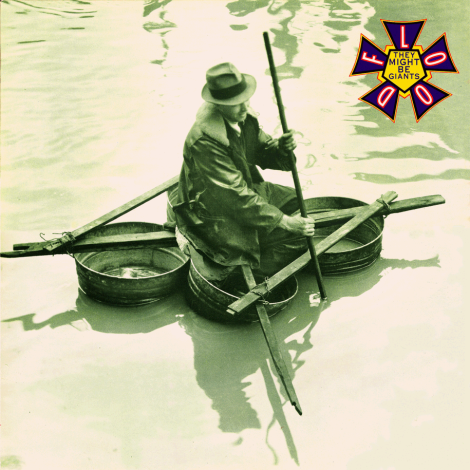As the 90s dawned, things were restless in the musical firmament. In the UK, we were coming to terms with the fact that we were still suffering from the hangover of terrible pop songs and even worse production methods that the 80s had blighted us with, and across the Atlantic folks were taking a long hard look at themselves and trying to figure out if all the Stadium Rawk was strictly necessary. Sure, here in the UK the rave and baggy movements were offering an alternative to pop cheese and hollow gestured rock, and the likes of The Wonder Stuff and Cud were proving that there might be hope as we entered the new decade, while across in America, Hip Hop continued to gather momentum and Grunge was starting to creep from the underground to blink into the daylight. Quite what the next big thing was going to be was genuinely anyone’s guess though.
Released during its first few days, They Might Be Giants’ Flood was one musical vision for the new decade and it was one that, in retrospect, maybe a lot more people should have signed up to. With a heady blend of accessible tunes, humour and a penchant for the accordion, The Two Johns (the guitar-wielding Flansburgh and the accordion-bothering Linnell) had already released a clutch of albums, the undisputed brilliance of which had seen them sign to the iconic Elektra record label. High on the confidence that a freshly-inked deal with a major record label undoubtedly brings, Flood saw They Might Be Giants aiming for a breakthrough with their patented brand of good-humoured and moderately educational geek-rock.
Starting with a chorus line of voices advertising the album itself, Flood automatically lays down a marker that it isn’t going to try and take itself too seriously, which all these years later obviously puts it at odds against the way that American rock music would go in the early years of the 90s. No matter though, as the second song would provide They Might Be Giants with their biggest hit single and the song that the majority of music fans still associate with them. While “Birdhouse in Your Soul” may sound dated today, in fairness it is now a quarter of a century old and you cannot deny its underlying brilliance as a pop song. It remains one of the great singles of the 90s and an obvious example of why guitar rock of the 90s didn’t have to equate to brooding Grunge or fashion-victim BritPop, even though it eventually by and large did.
Flood is much more than They Might Be Giants’ signature hit single though, as their celebrated cover of “Istanbul (Not Constantinople)” demonstrated that The Two Johns were comfortable nodding to a musical heritage that few acts of the time would acknowledge, and other celebrated songs like the sadly never more relevant “Your Racist Friend” and “Particle Man” show a surprising amount of range and depth for a band who here in the UK are often viewed as a bit of an oddity that struck lucky with a novelty hit. It’s this range which has seen me return to They Might Be Giants’, and particularly Flood, time and time again. While tunes like “Hot Cha” and “Whistling in the Dark” may lack the visceral emotion that the likes of Nirvana and Pearl Jam would offer up in the next few years, it’s difficult to deny that they’re genuinely great songs with a sense of fun.
Maybe even more than their depth and range, it’s They Might Be Giants’ sense of fun which has seen them endure when so many other Alternative Rock acts simply haven’t. They’ve not been afraid to diversify either, as since 2002 They Might Be Giants’ have managed to supplement their ‘standard’ musical output with a series of child-friendly albums that have seen them increase the educational elements of their music (something which has always been present in one form or another) and maintain the high standards of quality control when it came to their songwriting.
While 90s rock music would follow a different path to them, They Might Be Giants are still with us today, and remain a prolific, yet good natured, institution in the often volatile and ever-changing world of American Alt-Rock. Flood remains their best known album and the ideal starting place for those who avoid compilations in favour of more fully-realised artistic statements. They’ve even released a live version of Flood in recent days on which they’ve reversed its running order without losing any of its flow, proving that, while it may be 25 years old, it still has the ability to mesmerise an audience.














No Comment